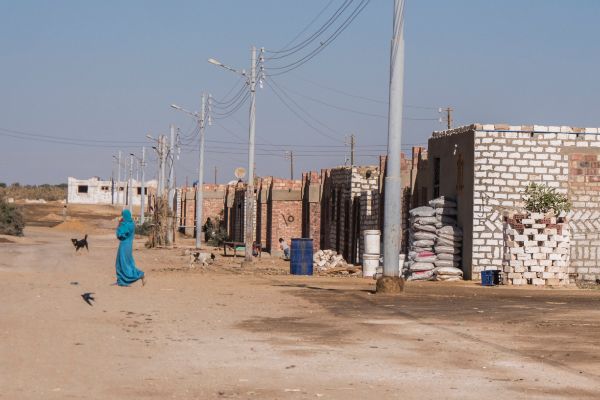A dusty and lonely road leads to the confines of Al Samaha, a government experiment that agonizes in the middle of nowhere. Faiza Ismail was one of the first women to inhabit the village of humble adobe homes built about three decades ago to provide a new existence for divorced, Egyptian widows and single women. "I came to live here 18 years ago. I was a widow and I arrived with two children," recalls the sexagenaria while her tired skeleton rests on the pole that extends along the facade of her home. Next to it, a group of neighbors share social gatherings. It is early in the morning and the village, located about 1,000 kilometers south of Cairo, is deserted. "Nobody listens to us. We feel alone," Faiza babbles. His comment quickly conveys the unanimity of the gang.
In the early 1990s, the Hosni Mubarak regime set up a pioneering program to expand the arable land of a country whose overpopulation is overcrowded in the punished Nile Basin. Al Samaha, deserted inside, was born as a pilot project dedicated to women who dragged the stigma of helplessness. It was the first rural community in the country supported exclusively by female labor. "In addition to housing, the Government gave us land to cultivate," says Faiza.
The Ministry of Agriculture granted each female about six fadanes of land (about 2.4 hectares) in the vicinity of the town. The gift was nothing advantageous. The terroir was a sterile portion, never carved that the neighbors had to tame with effort and between economic hardships. "We started working in agriculture with very few means. We had to borrow money to buy fertilizers and material," he says.
Fruit of his titanic work, wheat and hibiscus began to sprout from the fields surrounding Al Samaha. The only crop banned by the authorities was sugar cane, which grows in abundance in nearby Aswan. For years, the initiative worked thanks to the iron and sacrifice of its inhabitants to win the pulse of the desert. Until state aid began to be scarce and the few services offered by the wasteland wasteland - a small school and a modest office open a few days a week - also began to languish.
"I settled here 15 years ago and today the situation is much worse than then," says Reem, a Alexandrian who traveled three years ago in the country in search of a sort of refuge transfigured now in fiasco. "I earn a living with animals and agricultural tasks but the state of the town is terrible. We have no drinking water and access to health and education is very limited," complains one of the few neighbors who agrees to speak.
Without schools
The school, with its broken windows and its frame dilapidated by the sun, is the building that receives the few visitors who enter the town. A few meters, after the faded sign that welcomes, is the clinic, with its windows boarded by wooden boards. "A doctor comes every Sunday, Tuesday and Thursday. If you fall ill another day, you probably won't tell it," says Abdu el Awad, a teacher at the local school. "Here people are dying slowly. There are no sewage pipes and the water has a lot of salt. You have to bring water and food from the nearest town, about 10 kilometers away. Most women have only been able to fix one of the six fadanes. They would need 120,000 pounds (about 6,500 euros) to prepare the whole ground, "Abdu mutters.
In a corner of this diminished geography, infested with insects and snakes, Rashef has been running his family for five years. While the boys run around and play, take care of several donkeys in the backyard. "They give us money for having them here and feeding them," he says. The twenty-year-old is one of the first women who has broken the law that had so far governed the designs of Al Samaha: the prohibition of men inhabiting the moor. "Some women to whom the Government gave them house and land have sold their property. My husband bought one of the houses and we came from Sohag," argues the young woman.
Left to its fate and without government supervision, Al Samaha and its icon as a dedicated people to those who sought asylum in the face of a patriarchal and conservative society are extinguished. "The administrator who has been in charge of us for years usually comes and, when he hears our claims, he replies: 'We will see it tomorrow'. He always postpones our prayers," says Faiza, living memory of this peculiar essay now reduced to a cursed people . "Taxis refuse to come here. The road is not good and we are far from everything. We do not even have the services that other nearby towns have," he says.
At noon, a pair of starving donkeys crosses one of the streets of Al Samaha. The sun begins to tighten and the parish is sheltered in the meager shade of its identical dwellings, composed of two rooms, a kitchen, a toilet and a corral. In the distance, after the desolate mosque, a woman emerges like a mirage that carries one of her children in her arms while pushing her little flock of sheep. "The parliamentarians who claimed to represent us no longer come. Those are dedicated to applaud and approve any decision, as they are ordered to do. We are excluded from everything. This project is a ruin," Abdu concludes.
According to the criteria of The Trust Project
Know more- Egypt
Middle East The teenager who killed her rapist, the case that divides Egypt
Historical memory Paris dedicates a walk to Neus Català, one of the last Spanish survivors of the Nazi camps
Spain Two dead sexagenarians are found at home in Tenerife

